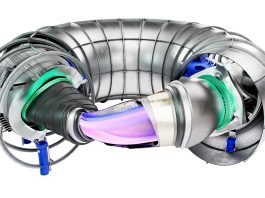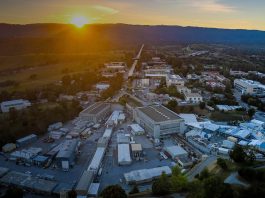The UK is taking a bold step towards a sustainable energy future with the launch of a dedicated Centre for Doctoral Training (CDT) in fusion engineering.
Starting in September 2025, this pioneering programme will equip the next generation of engineers with the expertise needed to advance fusion energy technology.
Led by top UK universities – Birmingham, Manchester, Sheffield, and Liverpool – alongside the UK Atomic Energy Authority’s (UKAEA) Fusion Futures initiative, the CDT will train over 150 postgraduates to tackle the industry’s most pressing challenges.
With fusion energy emerging as a game-changer for clean power, this initiative ensures the UK remains at the forefront of global fusion innovation.
Professor Arunodaya Bhattacharya, Chair in Fusion Energy at the University of Birmingham and Fusion Engineering CDT Deputy Director, commented: “Fusion Engineering CDT students are the future of the fusion industry, stepping into a field where the challenges are unprecedented, and the opportunities are limitless.
“Over the next 40 years, they will drive breakthroughs in technology, bridging critical knowledge gaps to make fusion a reality.
“The CDT isn’t just training researchers – it’s forging ‘Fusioneers’ equipped with the expertise to design, build, and operate the world’s first fusion power plants.
“With world-leading training and hands-on experience, they’ll be ready to make an immediate and lasting impact on the future of clean energy.”
Bridging the skills gap in fusion energy
As global interest in fusion engineering surges, the UK is strengthening its position as a leader in the field through substantial government and private sector investments.
These funds have accelerated research and innovation, fostering advancements in fusion technology.
However, sustaining this momentum requires a highly skilled workforce capable of tackling complex fusion engineering and operational challenges.
The Fusion Engineering CDT aims to fill this gap by training “fusioneers” – experts proficient in designing, building, operating, maintaining, and decommissioning future fusion power plants.
A comprehensive and industry-focused training model
The CDT’s curriculum offers a balanced approach, integrating theoretical, practical, and computational training across academic and industrial settings.
With a strong emphasis on real-world applications, doctoral students will gain expertise in data-driven modelling, simulation, and emerging technologies.
The programme also boasts extensive industry collaboration, incorporating insights from the aerospace, automotive, nuclear, AI, robotics, and computing sectors.
This hands-on approach ensures that graduates are well-prepared to contribute to the rapidly evolving fusion industry.
Pathway to chartered engineer status
The four-year programme will culminate in a Doctor of Engineering (EngD) qualification, a prestigious and industry-recognised degree.
Graduates will also be on a fast track to achieving Chartered Engineer (CEng) status, further cementing their professional credentials.
To ensure accessibility, all students will undertake a three-month foundational training course, delivered in a hybrid format, accommodating both university-based and industry-based participants.
This structure provides an inclusive entry point for STEM graduates from diverse backgrounds.
Nick Walkden, Head of Fusion Skills and FOSTER Programme Director at UKAEA, added: “I am delighted that after a very competitive bidding process, we have been able to select an academic team to embark on this exciting collaboration, which will supercharge the development of specialist engineering skills for the fusion sector.
“The programme combines international research excellence with deep fusion engineering expertise, and we look forward to working together in the coming years to build a world-leading platform for fusion engineering training.
“A particular highlight of this collaboration is the Fusion Engineering CDT Associate Membership scheme which will provide PhD support to a wider landscape of universities who share our commitment to invest in the future of fusion energy.”
The UK’s commitment to fusion engineering excellence
The establishment of the Fusion Engineering CDT underscores the UK’s commitment to maintaining its leadership in fusion technology.
By developing a robust pipeline of skilled fusion engineers, the UK is ensuring it remains at the forefront of the global fusion energy race.
The programme’s ‘hub-and-spoke’ model extends opportunities beyond the core universities, allowing other institutions to participate through an Associate Membership scheme.
With fusion energy poised to revolutionise the world’s energy landscape, investing in expert talent is more crucial than ever.
The UK’s proactive approach to fusion engineering education positions it as a powerhouse in sustainable energy innovation, paving the way for a cleaner and more secure energy future.









